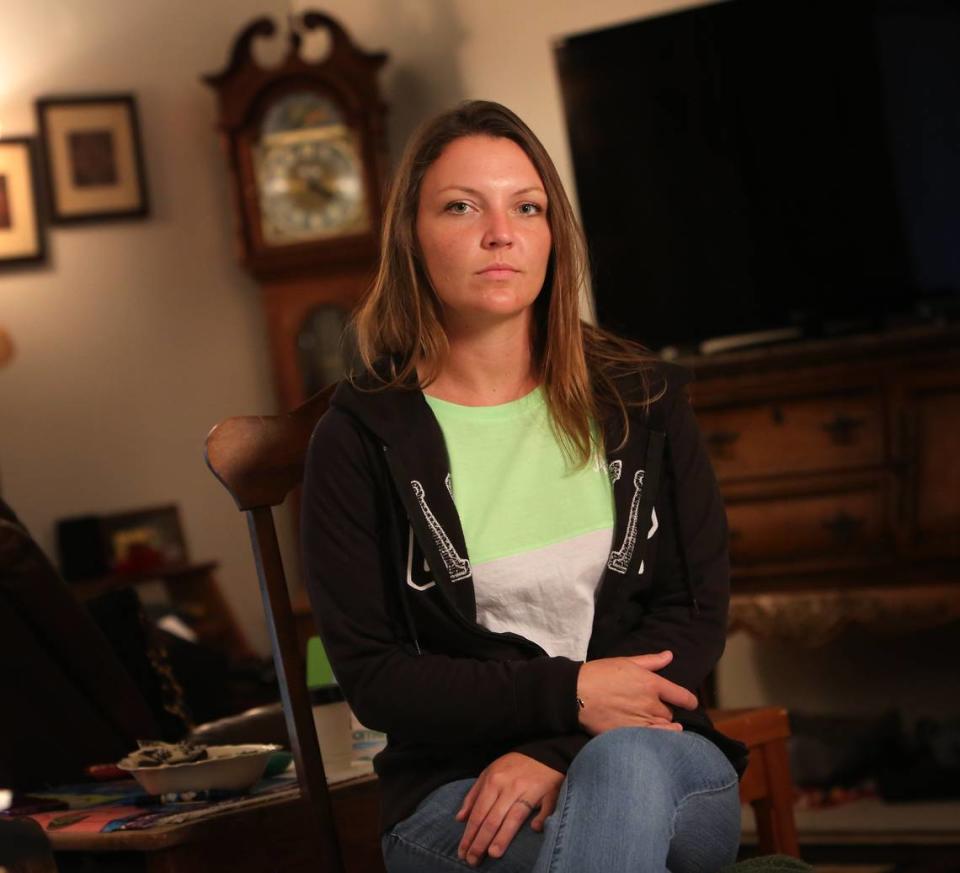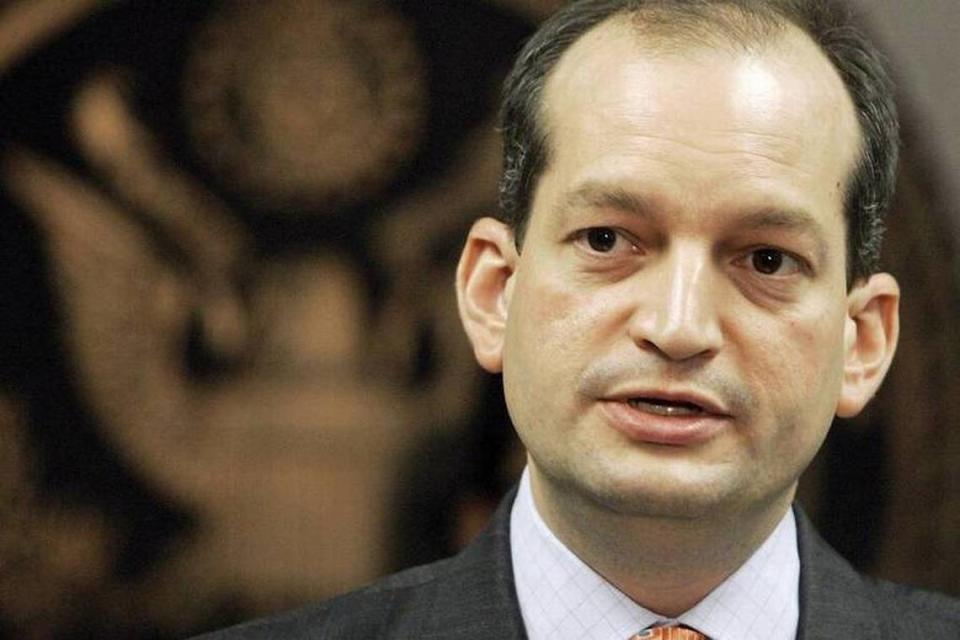Judges call Jeffrey Epstein case a ‘national disgrace,’ but reject bid to undo deal
Even as they called the Jeffrey Epstein case “beyond scandalous” and a “national disgrace,” a three-judge panel rejected a petition by one of the sex trafficker’s young victims to undo an agreement by federal prosecutors not to prosecute him on sex-trafficking charges more than a decade ago.
The judges, in a 2-1 decision, narrowly rejected Courtney Wild’s petition Tuesday seeking to compel federal prosecutors to charge the multimillionaire on the grounds that the feds violated Wild’s and other victims’ rights when they cut a secret deal with him behind victims’ backs, allowing him to plead to lenient solicitation charges in state court.
The 11th U.S. Circuit Court of Appeals in Atlanta ruled that because prosecutors never brought charges against Epstein in the federal court in South Florida, his victims were not legally allowed to seek relief under the Crime Victims’ Rights Act.
“Despite our sympathy for Ms. Wild and others like her, who suffered unspeakable horror at Epstein’s hands, only to be left in the dark — and, so it seems, affirmatively misled — by government lawyers, we find ourselves constrained to deny her petition,” Judge Kevin Newsom wrote in the majority opinion, joined by Judge Gerald Tjoflat.
“Because the government never filed charges or otherwise commenced criminal proceedings against Epstein, the CVRA was never triggered,” Newsom concluded. “It’s not a result we like, but it’s the result we think the law requires.”
The panel’s decision is likely to be appealed to the full 11th U.S. Circuit Court of Appeals because of a sharply critical dissent by the third panelist, Judge Frank Hull.
“The majority concludes that our court is constrained to leave the victims ‘empty handed,’ and it is up to Congress to ‘amend the [CVRA] to make its intent clear,’ ‘’ Hull wrote. “Not true. The empty result here is only because our court refuses to enforce a federal statute as Congress wrote it. The CVRA is not as impotent as the majority now rewrites it to be.

“Given the undisputed facts that the U.S. Attorney’s Office [in Miami] completed its investigation, drafted a 53-page indictment, and negotiated for days with Epstein’s defense team, the office egregiously violated federal law and the victims’ rights by not conferring one minute with them [or their counsel] before striking the final [non-prosecution agreement] deal granting federal immunity to Epstein and his co-conspirators,” Hull concluded.
Wild’s attorneys zeroed in on Hull’s dissent.
“For all the reasons given in the 60-page dissenting opinion, we strongly disagree with today’s ruling — which leaves victims like Ms. Wild without any remedy, even for victims like her who have been ‘affirmatively misled’ by federal prosecutors,” attorney Paul Cassell said. “We will be seeking rehearing en banc before the full Eleventh Circuit.”
Wild, who previously identified herself as Jane Doe 1 in the victims’ rights landmark lawsuit filed a decade ago against the U.S. government, said she was baffled by the majority’s ruling on her appeal.
“This is impossible to understand — the government intentionally misled the victims but found a way to get away with it by working with a child molester to get around the law,” Wild said Tuesday. “And the judges ruled in their favor. How?”
Wild’s latest petition, filed in October, challenged U.S. District Judge Kenneth Marra’s decision that she and others were not eligible for any major relief, even though he found federal prosecutors violated the rights of Epstein’s victims by leaving them in the dark about his non-prosecution agreement with the U.S. Attorney’s Office in Miami.
That office, which was headed at the time of the deal by Alexander Acosta — who later became President Donald Trump’s secretary of labor — has recused itself in the civil case and is represented by the U.S. Attorney’s Office in Atlanta.
Wild and another plaintiff, Jane Doe 2, wanted the judge to restore the originally planned federal sex-trafficking charges against Epstein in South Florida, but Marra refused to go that far for a couple of reasons.
Epstein, 66, died in August 2019. He was found hanging in a Manhattan jail cell following his arrest on renewed sex-trafficking charges levied by the U.S. Attorney’s Office in Manhattan. The arrest by federal authorities in New York City, where Epstein also maintained a home, followed an investigative series in the Miami Herald, Perversion of Justice, that dissected the decision not to charge Epstein federally and, for the first time, presented interviews of Epstein’s victims, including Courtney Wild.
Marra said he did not have the authority to order federal prosecutors in South Florida to charge him, even before Epstein’s death.
In his September ruling, Marra left open the possibility that certain requests by the victims could be fulfilled. They wanted to meet with prosecutors and get an explanation for why the U.S. Attorney’s Office in South Florida didn’t seek a sex trafficking indictment against Epstein when he was initially investigated 10 years earlier, and why they kept the status of the case secret from the victims.
But Wild’s petition to the 11th U.S. Circuit Court of Appeals said Marra’s decision failed Epstein’s victims.
Wild’s petition sought to have the appeals court order Marra to invalidate provisions of Epstein’s 2008 non-prosecution agreement barring the prosecution not just of him, but of his alleged co-conspirators, who were suspected of recruiting underage girls to have sex with him at his Palm Beach mansion.
Her petition also requested a court hearing where Epstein’s victims could speak about how he preyed on them, and asked for the disclosure of important government documents in the case. Her lawyers, Paul Cassell and Bradley Edwards, are also seeking attorneys’ fees.
In February of last year, Marra found that federal prosecutors violated the Crime Victims’ Rights Act in 2007-08 when they failed to confer with Wild and the other victims before executing the non-prosecution agreement with Epstein.

At that time, Epstein was allowed to plead guilty to state charges of soliciting minors for prostitution, leading to the filing of the victims’ rights lawsuit by Jane Doe 1 [Wild] and Jane Doe 2. Under that agreement, Epstein served only 13 months in jail and was allowed to be released during the day throughout his incarceration. He also had to register as a sex offender in Florida. Additionally, Epstein was required to pay damages to about 40 underage victims.
In a 15-page ruling, Marra found that because of Epstein’s death in August, the women’s requests for certain remedies — such as filing the original 53-page federal indictment that was drawn up and then shelved — must be denied as “moot.” The judge reiterated what he ruled before Epstein’s death — that the court did not have the authority to order federal prosecutors to bring such charges after they declined to do so initially.
But Hull, the lone woman on the three-judge appellate panel, sharply disagreed with Marra and her own colleagues: “The majority’s new blanket restriction eviscerates crime victims’ CVRA rights and makes the Epstein case a poster-child for an entirely different justice system for crime victims of wealthy defendants.”

